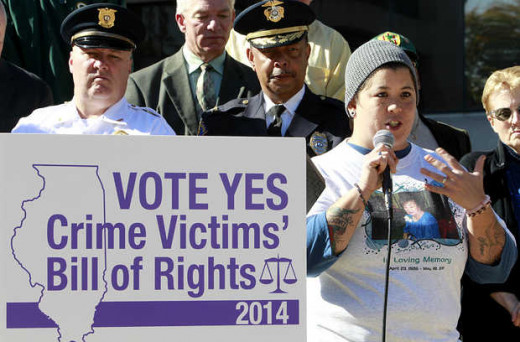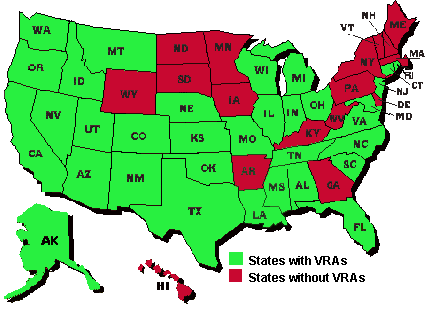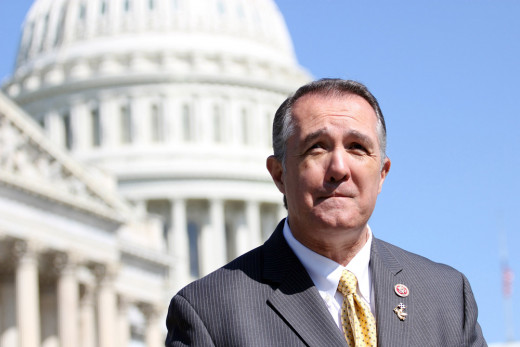Proposing the Victims' Rights Amendment: A Constitutional Challenge
Fighting for enforcement of Illinois VRA

The latest version of a federal VRA
- Proposing an amendment to the Constitution of the United States to protect the rights of crime victi
Official Summary of H.J.Res.40 - 113th Congress (2013-2014)
Throughout history, there has been an extensive debate over the rights of accused criminals and the rights of the victims of crimes. Far from being a modern debate, social philosophers of the 1700’s challenged the practice of cruel torture, harsh penalties, and unfair criminal trials. The founding fathers of the United States, inspired by philosophers like Beccaria, Kant, and Locke, developed a government based on constitutionalism and federalism. Committed to the ideals of “life, liberty, and the pursuit of happiness,” the writers of the Constitution issued citizens a Bill of Rights in ten amendments. The amendments addressed personal freedoms; but more importantly, nearly half are dedicated to the rights of the accused.
While the Constitution can be modified through an amendment process, it is a rarity; in the 228 years of its existence, only seventeen more amendments have been added. Over the last two decades alone, hundreds of amendments have been proposed by Congress including:
- rights to equal, high-quality health care
- establishing campaign spending limits
- extension of rights to unborn children.
On September 4, 2003, the Senate Judiciary Committee narrowly approved a proposed constitutional amendment: The Victims’ Rights Amendment.
Then-president, George W. Bush had been a long-time supporter of the proposal. During a speech in April 2002 at the Department of Justice, the president stated:
“…the states as well as the federal government…passed legal protections for victims…those laws are insufficient to fully recognize the rights of victims. Victims of violent crime have important rights that deserve protection in our constitution.”
The American Civil Liberties Union (ACLU) opposed the measure and has repeatedly urged lawmakers to reject the amendment as it “would likely run counter to the interests of Americans hurt by crime…the goals…could be achieved…with less risk without changing the constitution.” They warn it “would erode due process” (ACLU Warns).
Ten years later, in April 2013, another version of a Victims' Rights Amendment was proposed by Representatives Trent Franks, Jim Costa, and Edward Royce, entitled: "H.J.Res. 40 - Proposing an amendment to the Constitution of the United States to protect the rights of crime victims."
Strong arguments appear on both sides of this issue; undoubtedly, its implications are far reaching. There is an important issue that cannot be missed: if the Victims’ Rights Amendment were ratified, we would risk the meaning of constitutionalism and federalism as we know it.
States with Constitutional VRAs

Victims' Rights at the State Level
Although the overall crime rate in the United States has declined steadily since 1994, according to the 2002 National Crime Victimization Survey, residents age 12 or older experienced approximately 23 million crimes in that year alone. Because victims often experienced poor treatment from the justice system and social services organizations, a number of victims decided to advocate for social change following the 1982 Presidential Task Force on Victims of Crime, which recommended a federal constitutional amendment. Today, all fifty states have laws to protect victims’ rights. Thirty-four states have amendments to their constitutions, which include:
(National Victims’ Rights Constitutional Amendment Network).
- “the right to be treated with dignity and respect by the criminal justice system; prior notification of trial court, appellate and parole proceedings;
- upon request, to gain information about the sentence, incarceration, and release of the defendant;
- to be present and heard at various stages including pre-trial, trial, and sentencing;
- and a right to seek restitution from the criminal.”
Rep. Trent Franks (R-AZ)

Victims' Rights at the Federal Level
Although there are laws and constitutional amendments to protect victims on a state level, there is a greater movement to pass an amendment at the federal level. It is no coincidence this movement began at the state level. It is, in fact, the best way to gain support for a federal constitutional amendment because three-fourths of the state legislatures (38 states) must ratify an amendment before it can be added to the Constitution.
There is no absence of federal legislation on this issue. In fact, according to the National Institute of Justice, the Victims’ Rights and Protection Act of 1990, and subsequent statutes, gave victims of Federal crime most of the rights available at the State level. Proponents believe it is necessary to guarantee these rights in the Constitution primarily because according to survey research conducted by the National Victim Center, despite strong state legislation, a substantial number of victims were denied the statutory rights. MADD (Mothers Against Drunk Driving), one of the largest crime victim organizations in the world, charges the Constitution as having established rights for the accused but none for the victim (thereby leaving victims “seriously shortchanged.” (MADD).
MADD is by no means the only grass roots organization pushing for a federal amendment. The Stephanie Roper Committee, which has made significant contributions in the state of Maryland, has helped to pass nearly three dozen victims’ rights bills at the state level since 1983 (Office for Victims of Crime). Roberta Roper leads this victims’ rights advocacy group. It was named for her daughter, Stephanie, who was kidnapped, raped, tortured, and murdered. Ms. Roper stated in a 1995 interview with American Legion Magazine:
"…victims and survivors want the system to give them information…want a certain amount of compassion and understanding…want satisfaction with the process…we want appropriate punishment. In Stephanie’s case, it seemed like misuse of language that her killers got two life sentences plus twenty years, and they would be eligible for parole in eleven and a half years." (Winters 155).
The National Victims Constitutional Amendment Network (NVCAN) was established in an effort to “assess the status of victims’ state and federal rights and provide educational materials to enhance victims’ access to rights and services.” NVCAN acknowledges “many victims remain unaware of their rights and how to assert them.” NVCAN’s sister organization, The National Victims’ Constitutional Amendment Project (NVCAP), is working diligently to pass the federal constitutional amendment.
In 1996, President Clinton gave one of the most compelling statements in support of the Victims’ Rights Amendment:
"Participation in all forms of government is the essence of democracy. Victims should be guaranteed the right to participate in proceedings related to crimes committed against them. People accused of crimes have explicit constitutional rights. Ordinary citizens have a constitutional right to participate in criminal trials by serving on a jury. The press has a constitutional right to attend trials. It is only the victims of crime who have no constitutional rights to participate…When someone is a victim, he or she should be at the center of the criminal justice process, not on the outside looking in."
Former U.S. Attorney General, Janet Reno lent support to President Clinton in her testimony to the U.S. House Judiciary Committee the following year, “Unless the Constitution is amended…we will never correct the existing imbalance in this country between the defendants’ constitutional rights and the current haphazard patchwork of victims’ rights” (MADD).
The drafting of the amendment began in the mid-1990s. After a seven-year “tug-of-war” over the language of the amendment the bipartisan efforts of Senators John Kyl (R-AZ) and Dianne Feinstein (D-CA) culminated in a proposal, which passed the Senate Judiciary Committee on September 4, 2003.
Steven Twist served as the chief assistant attorney general for Arizona from 1978 until 1999 and authored the Arizona constitutional victims’ bill of rights. He gave testimony to the House Judiciary Committee: Subcommittee on the Constitution on September 30, 2003. Twist suggested critics of the amendment are not for “…rights that are meaningful and enforceable…and established as a birthright for every American…the statutes are sufficient.” He made his case:
"The threat of the loss of liberty or even life, which a defendant may face, is not a sufficient reason to denigrate the rights of victims…the right to notice of proceedings does not abridge the rights of the accused, the right not to be excluded from proceedings does not, the right to be heard, a voice, not a veto on matters does not…the right to have safety, unreasonable delay and restitution…does not affect the rights of the offender. Surely they do not contend that victims should not be given notice of proceedings in their cases because it is too costly. The presumption of innocence importantly…requires the government prove beyond a reasonable doubt the elements of each offense…nothing in the amendment alters this…”
It is difficult to argue against the amendment because most people would not want to be known for being against victims and for criminals. After all, crime represents a serious threat to society; certainly, no one wants to become a victim. No state victims’ rights amendment or law has been passed without at least 58% of the vote. In fact, in many instances, they have been passed with over 90% of the vote. Most state constitutions explicitly state that the rights of victims cannot reduce the rights of the accused; however, the 2003 proposal did not include such a statement. In contrast, the 2013 proposal stated:
The rights of a crime victim to fairness, respect, and dignity, being capable of protection without denying the constitutional rights of the accused, shall not be denied or abridged by the United States or any State.
And so, there are challenges: the extent we are willing to go in the name of protecting victims; balancing victims’ rights with those of the accused; and the risk of civil liberties.
Share your opinion
Do you think a VRA should be added to the Constitution of the United States
April 24, 2013 - Representative Trent Franks speaks about the Victim's Bill of Right's Amendment
The Reason Victims' Rights are Not in the Constitution
Could our Founding Fathers forgotten all about the rights of victims when drafting the Constitution? Roger Pilon, PH.D., J.D., the Senior Fellow and Director for the Center for Constitutional Studies at the CATO Institute, would say “no.” He explained in his rationale in his testimony before the Committee on the Judiciary in the United States Senate in 1997. He found it inconsistent to add an amendment addressing victims’ rights when there is so little federal power to begin with to address crime. He demonstrates the imbalance of victims’ and accused rights was indeed deliberate:
"There is a fundamental reason for that imbalance. It has to do with the very purpose and structure of the Constitution…On one hand, the Framers wanted a government strong enough to carry out the functions they had assigned it. On the other hand, they did not want government to exercise its powers in ways that would violate our rights. They were especially concerned to limit the police powers of government, the power to secure our rights for they knew from experience that in the name of so basic and worthy an end, great abuse might occur That is why they left the police power almost entirely in the hands of the states, where it was closer to the people. The entire approach of the Framers to constitutionalism, then, was essentially guarded. It is a lean, limited government empowered to do a few things, in limited ways…there is no general federal police power." (Italics added).
In essence, Congress and the federal government should not have an explicit role in the criminal justice system; it is an area which should be remanded and kept within the states and the people in order to avoid turning America, the nation, into a police state.
MADD says, “It will take an amendment to the U.S. Constitution for crime victims to have their say in court, where decisions are made daily about their cases.” Most arguments by victims’ advocates almost always include those two words: “their case.” No one will dispute crime affects individuals; many victims and families have their lives ruined by crime. But government is concerned with how crime affects society as a whole; that is why the prosecutor in court represents “the state” or “the people.” Despite the victims' pain, suffering, and personal loss, a criminal trial is not the victim’s case. The court proceeding belongs to the state not the individual crime victim.
Philip Brasor, in the October 5, 2003, edition of the Japan Times wrote:
"Criminal trials are designed as confrontations between persons accused of crimes and the state, not victims. The search for truth that can end with a person losing his freedom or life demands an objective attitude and laws that are fair and unbiased. The premise of having victims confront defendants runs counter to the spirit of a fair trial because the inclusion of an alleged victim…could imply predetermined guilt.”
Civil Litigation versus Criminal Litigation
There is a reason why we have a separate civil court system and a criminal system. Civil litigation gives the individual the opportunity for restitution where the burden of proof is based on a “preponderance of the evidence,” a lower standard of proof, unlike a criminal trial where one is found guilty “beyond a reasonable doubt.” Should the Victims’ Rights Amendment (VRA) be added to the Constitution of the United States, it would be nearly impossible to juggle them alongside the Amendments that deal with the rights of the accused, which include:
- No person shall be held to answer for a capital, or otherwise infamous crime, unless on a presentment or indictment of a Grand Jury; nor shall any person be subject for the same offense to be twice put in jeopardy; nor shall be compelled in any criminal case to be a witness against himself, nor be deprived of life, liberty, or property, without due process of law; nor shall private property be taken for public use, without just compensation (Fifth Amendment);
- the accused shall enjoy the right to a speedy and public trial, by an impartial jury of the State and district; to be informed of the nature and cause of the accusation; to be confronted with the witnesses against him; to have compulsory process for obtaining witnesses in his favor, and to have the Assistance of Counsel for his defense (Sixth Amendment);
- the right of trial by jury shall be preserved (Seventh Amendment);
- excessive bail shall not be required, nor excessive fines imposed, nor cruel and unusual punishments inflicted. (Eighth Amendment).
The VRA would add that victims have:
“...rights to reasonable notice of, and shall not be excluded from, public proceedings relating to the offense, to be heard at any release, plea, sentencing, or other such proceeding involving any right established by this article, to proceedings free from unreasonable delay, to reasonable notice of the release or escape of the accused, to due consideration of the crime victim's safety and privacy, and to restitution.”
Much of the proposed amendment is most assuredly vague. The exact meaning would have to “spelled out in statutes and case law” (Weed 244.). Furthermore, consider that many murder cases take years to put together - to collect enough evidence for a grand jury indictment, let alone a trial; it is that particular kind of scenario that might be challenged under the VRA's term of “unreasonable delay.”
The VRA is a measure the American Civil Liberties Union (ACLU) says “threatens the system of checks and balances in the nation’s criminal justice system and undermines the bedrock American principle of innocent until proven guilty.” Terri Ann Schroeder, an ACLU legislative analyst stated on September 4, 2003, “the Senate should reject this dangerous measure.” (ACLU Senate Panel Approves).
In a statement released by the ACLU on September 30, 2003, it warned “[a VRA] would undercut basic due process protections that are designed to keep innocent defendants out of jail. Victims…would be able to deliver inflammatory remarks during different stages of a trial, which could serve to unfairly prejudice juries.” (ACLU Warns).
The ACLU is not the only organization against this proposition; a host of judges, prosecutors, law professors, and even some victims’ rights groups oppose the measure. Prosecutors are concerned the amendment could obstruct justice in many cases by blocking plea agreements that are granted to compel testimony of key witnesses. In his essay, “The Justice System Should Not Overemphasize the Rights of Victims,” Andrew L. Sonner, the state attorney for Montgomery County, Maryland, writes that the criminal justice system should:
…ease the burdens of victims. But legislative efforts designed to improve the treatment of victims should be subjected to rigorous scrutiny to assure that the collateral consequences of well-intentioned reforms do not damage public prosecution or fundamental fairness. Will some vengeful victims, by injecting their wishes formally into the process, tip the scales so that the influence and standing of the victims drives the severity of the sentences? To whom should the legislation apply? Making the rights apply to all victims of crime not only entails enormous costs, but often involuntarily injects victims more deeply into prosecution than is warranted or than many of them want. (Winder 160.).
Interestingly enough, the National Network to End Domestic Violence (NNEDV), a national coalition of domestic violence prevention advocacy groups, has taken a position against the proposed Victims’ Rights Amendment, and with good reason. It is concerned that battered women, who are often arrested and charged with assaulting their own batterers, would lose the right to a fair trial and the presumption of innocence. (Causes That Matter).
Dave Kopel, an associate policy analyst with the Cato Institute and Elisabeth Semel, a criminal defense attorney in San Diego and legislative co-chair of the National Association of Criminal Defense Lawyers, co-wrote an article on behalf of the CATO Institute entitled “Victims’ Rights Amendment is All Wrong.” Concerned about the effect of the VRA on domestic violence, they expressed their outrage:
…the battered wife who finally stabs her husband after years of being brutalized must be ordered to pay restitution. The same for the frustrated homeowner who burns down the neighborhood crack house. The right to a speedy trial…when constitutional overrides the legitimate preparatory needs of both the prosecution and the defendant. If there is anything that the failure of three decades of “tough-on crime” congressional bluster should have taught us, it is that Congress almost always makes matters worse when it intrudes in the criminal justice system.
One thing is a certainty, according to Kopel and Semel:
Victims by tens of thousands will protest that they cannot advocate effectively in a legal forum without counsel. Criminal courts will become the province of three legal adversaries…indigent victims (which are the overwhelming majority will insist upon the appointment of counsel…since according to amendment sponsors the very purpose of the amendment is to elevate (self-selected) victims to the same constitutional status as the accused. Adding numerous procedural layers to our criminal justice system will not reduce the number of victims…the cost (would be)…immense, permanent damage to our precious Constitution.
Aside from any concerns of complicating the justice system or risking the rights of the accused, there are conservative commentators who resist the idea of adding this amendment to the Constitution. Washington Post columnist George Will wrote, “There should be a powerful predisposition against unnecessary tinkering with the nation’s constituting document, reverence for which is diminished by treating it as malleable.” (ACLU Warns).
In a 2002 guest commentary on PoliticsOL.com, Democratic Senator from Wisconsin, Russ Feingold, shared his concerns about the proposed VRA:
"To change the Constitution now is to say that we have come up with an idea that the Framers of that great charter did not. It is difficult to believe that the basic calculus of prosecutor, defendant, and victim has changed much since the foundation of the Republic…public prosecutions were the norm when the Constitution was written and adopted. I also believe that the needs of all victims are impossible to foresee. Statutes are a better, more flexible, and faster response than amending the Constitution…amendments cannot be easily modified.”
The Now Legal Defense and Education Fund chairs the National Task Force on Violence Against Women. It works extensively on behalf of women who are victims of violent crime and did not agree with the amendment. In its opinion, amending the federal Constitution was not a favorable strategy and “cannot endorse a federal constitutional amendment elevating the legal rights of victims to those currently afforded the accused.” It does, however fully endorse efforts to improve the criminal justice system, including initiatives to ensure consistent enforcement of existing…laws.” The organization also maintains that a federal VRA is “problematic” in a number of ways:
"The accused, who must be presumed innocent, and may in fact be innocent, is at the mercy of the government and faces losing her liberty, property, or even her life as a consequence…could undercut the presumption of innocence by naming and protecting the victim as such before the defendant is found guilty of committing the crime."
There are concerns about the definition of “victim,” whether victims would be afforded a right to counsel, and how a victim's proposed right to a speedy trial balances against a defendant’s due process rights. (NOW Legal Defense). Roger Pilon would agree:
"The primary way, in which victims have their rights vindicated, is not through the criminal but through the civil law. It is the business of the state to protect us from each other, as much as it can, and to punish those who injure us. It is our business to seek redress from those who injure us, to vindicate the rights that have been violated by the criminal. When rights that belong properly in the civil forum are transported to the criminal forum, confusion and conflict may ensue. That is a very real risk.”
Judges determine what kind of evidence is acceptable at trial. If victims should gain federal constitutional rights, it could significantly change what kind of evidence might be presented, with a more than likely unfavorable, unfair result. Roger Pilon raised an additional question in his congressional testimony:
“Would failure to convict, perhaps because of the higher standard of proof for a criminal conviction, undermine any right of the victim to a restitution order, which might have been obtained in a civil action against the defendant?” (Pilon).
Additionally, there are those victims without families or next of kin who would have no one to speak on their behalf at any stage of the criminal proceeding with the exception of a prosecutor. That would hardly be fair under a VRA. One could only hope that those found guilty without the representation of a victim would be subject to the same sentence as another who had an opportunity to provide an impact statement to a jury.
Tension between the rights of the accused and the rights of victims plays out in court.
There is argument at the individual state level about the right to be informed and heard at a plea bargain. Clarifying the 1992 New Mexico amendment has put judges, prosecutors, and victims’ rights groups at odds.
The Albuquerque Journal, reported on a Sandoval County case centered on the sentencing phase of Jimmy Saiz, a 42-year old man charged with second-degree murder of Mona Chavez. He accepted an agreement to plea to the lesser charge of leaving the scene of an accident. The District Court Judge “refused the prosecutor’s request to postpone sentencing so the victim’s mother might testify.” The Judge ruled against her testimony because he intended to give Saiz the maximum sentence. The mother had not been made aware of the plea. The New Mexico Victims’ Rights Project filed a motion asking Brown to set aside the pleas agreement because the mother had not been consulted as required by state law. Prosecutors and defense lawyers agreed the mother had no standing to seek to set aside the plea. The judge agreed and stated he believed, “there is a strong double jeopardy argument, which could cause all charges against Mr. Saiz to be dismissed.” It is these kinds of scenarios that appear that make the VRA a frightening proposal.
The amendment would give victims certain rights, several of which are open to interpretation. Prosecutors and law enforcement fear the guarantee to be heard at every proceeding would in effect “tie their hands” in keeping extremely violent criminals off the streets by blocking plea bargains, which are used to gain crucial testimony in big cases.
The Final Analysis
Enforcement of the amendment would prove to be extremely difficult, perhaps impossible. Certainly, since the accused is entitled to defense counsel, it would be reasonable for a victim to be entitled to counsel to ensure her own rights and to be represented in court. It is complicated enough for judges and juries to ascertain the truth (innocence or guilt) with prosecuting and defense attorneys arguing in a courtroom. The addition of another dimension to the trial, would significantly tip the scales of justice. Victims’ perspectives are not without their prejudices; they are highly emotional. Logical procedure is critical in the maintenance of a fair trial.
During the summer of 2003, Terri Schroeder acknowledged, “our criminal justice system sometimes treats the victims of crime with insensitivity; however, we can’t solve that problem by using whiteout on the Constitution.” (ACLU Calls VRA Misleading). Those who advocate the VRA seem to forget their own rights have not been omitted from the Constitution, though not explicitly stated. The Ninth Amendment provides:
The enumeration in the Constitution, of certain rights, shall not be construed to deny or disparage others retained by the people,” and “The powers not delegated to the United States by the Constitution, nor prohibited by it to the States, are reserved to the States respectively, or to the people.
If advocates of the amendment believe it would be unjust not to pass the amendment, they might want to consider other amendments which have been proposed but were never ratified by the States:
- congressional rights to abolish slavery
- congressional rights to regulate child labor
- equal rights for men and women
- and representation of the District of Columbia in Congress
If these types of amendments could not be passed; surely the VRA is fighting an uphill battle. Sometimes, it is a tough call.
Congress’ last attempt to curtail individual freedoms resulted in the Prohibition Amendment. There was simply no way to enforce it. Instead it created more crime - organized crime. A complete failure, prohibition was repealed. The VRA, while its goals are noble, will turn the criminal justice system upside down and will completely change the meaning and intention of the United States Constitution.
If laws are “insufficient to fully recognize the rights of victims,” like former President, George Bush said, then the laws should be re-evaluated, re-written, or funding should be allocated to enforce the laws. There is no documented research to demonstrate why these policies and statutes fail, of which I am aware; yet. it is imperative to understand these failures. We simply cannot use the Constitution of the United States as a band-aid for failed state statutes.
There are too many holes in the VRA. Only victims of violent crime are protected. Their right not to be excluded and to be reasonably heard can interfere with the prosecution of a case. Plea bargains set the stage to apprehend more dangerous criminals. Victims’ statements at hearings or at other stages, or being identified in court as being a victim can unfairly prejudice a jury, since the defendant is innocent until proven guilty. Consideration for the “victims’ safety and unreasonable delay” are vague statements to say the least. “Unreasonable delay” can interfere with the time needed to prepare a defense. Additionally, the VRA is vague about who may claim victim status.
Victims, undoubtedly, need to be treated with respect and compassion. They deserve notification of the progress in the case. The consequences of a victims’ rights amendment would prove to be devastating to our country. Criminal proceedings are matters of the state and the people of the state; they do not belong to the victim. Criminal trials are designed to determine the guilt of the accused and seek retribution, not restitution. Victims’ claims to restitution can be satisfied in a civil proceeding, in their favor, where the burden of proof is less than in a criminal trial. It is also unfair to use public tax dollars in order to seek personal redress in a criminal trial.
The wording in the amendment was contradictory because there were no penalties or ways to claim damages for violations of the rights it sought to address.
Finally, the most significant reason to defeat the amendment is located in the foundation of our country: constitutionalism and federalism. It is not by coincidence the Framers of the Constitution left out the rights of victims and did not address criminal justice within its framework. The involvement of the federal government in the criminal justice system will pose a serious and direct threat to individual freedom. It diminishes the goals of federalism and the powers which rest in the states. The Constitution is clear:
“The powers not delegated to the United States…nor prohibited by it to the States, are reserved to the States or to the people." (Ninth Amendment).
Giving Congress the power to appropriate legislation to enforce the amendment is a contradiction to one of the fundamental principles established in the Constitution: limited government. Good intentions will never protect civil liberties or the right to fair trials.
A VRA would transform the criminal justice system, undermine the Constitution, and strip the rights of the states to control criminal proceedings. The world has seen many times when federal governments heat up to control a criminal justice system; they create an inferno of injustices.
Works Cited
Albuquerque Journal. “Judge responds to Editorial.” West Side Journal. 20 Aug. 2003.
American Civil Liberties Union. “Senate Panel Approves Proposed Constitutional Amendment on Victims’ Rights: Sends Dangerous Measure to Senate Floor for Possible Consideration.” 4 Sept. 2003.
American Civil Liberties Union. “ACLU Warns that Proposed Victims’ Rights Amendment Would Erode Due Process, System of Checks and Balances.” 30 Sept. 2003.
Brasor, Philip. “Role of Victims in Court Needs Careful Monitoring.” The Japan Times. 5 Oct. 2003.
Causes That Matter Clearinghouse. “Take Action: Wrong Answer to Victims’ Rights.” 26 Mar. 2003.
Feingold, Russ. “Is Victims’ Rights Amendment Really Necessary?” PoliticsOL.com. 24 July 2002.
Kopel, Dave and Elisabeth Semel. “Victims’ Rights Amendment is All Wrong.”Cato Institute. 20 Sept. 1996.
Mothers Against Drunk Driving. “National Constitutional Amendment for Victim Rights.” MADD Driven Magazine. Fall 1997.
National Organization of Women. “Position Statement Against Proposed Victims’ Rights Amendment.” NOW Legal Defense. May 2002.
National Victims' Constitutional Amendment Passage. “Victims' Rights Educational Project.” NVCAN. 1 Nov. 2003.
Pilon, Roger. “CATO Congressional Testimony before the Committee on the Judiciary, United States Senate.” 16 Apr. 1997.
Twist, Steven J. “Statement before the Constitution Subcommittee: U.S. House of Representatives Committee on the Judiciary.” 30 Sept. 2003.
United States. Department of Justice: Bureau of Justice Statistics. 2002 National Crime Victimization Survey.
United States. Department of Justice. “The Rights of Crime Victims: Does Legal Protection Make a Difference?” National Institute of Justice Research in Brief. Washington. GPO, 1998.
United States. Department of Justice: Office of Justice Programs; Office for Victims of Crime. “From Pain to Power: Crime Victims Take Action.” Washington. GPO, Sept 1998.
United States. House of Representatives. “Constitutional Amendments Not Ratified.” 2 Nov. 2003.
The White House. “President Calls for Crime Victims’ Rights Amendment.” 16 Apr. 2002.
Winters, Paul. America’s Victims: Opposing Viewpoints. San Diego: Greenhaven, 1996.
Originally written and published on January 13, 2015. Latest corrections and edits made on February 21, 2015.
By Liza Lugo, J.D.
(c) 2012, 2014. All Rights Reserved.
Ms. Lugo retains exclusive copyright and publishing rights to all of her articles and photos by her located on Hub Pages. Portions of articles or entire content of any of these articles may not be used without the author's express written consent. Persons plagiarizing or using content without authorization may be subject to legal action. The articles by Ms. Lugo regarding legal issues are purely academic in nature and do not constitute legal advice. For advice on legal matters, consult a licensed attorney in your jurisdiction.
This hub was originally published under the title "Do Victims of Crime Have a Voice? The Implications of a Victims' Rights Amendment." It has been substantially updated and revised.
Permission requests may be submitted to liza@lizalugojd.com.








